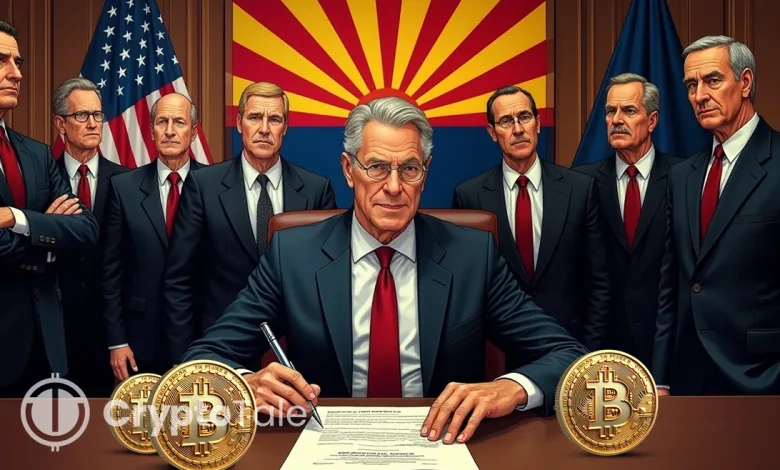Arizona Becomes Second State to Enact Crypto Reserve Bill

- Arizona becomes the second U.S. state to legalize a crypto reserve for unclaimed digital assets.
- HB 2749 allows the state to retain crypto in native form and earn staking rewards or airdrops.
- Governor Hobbs signed the bill days after vetoing a broader proposal to invest public funds in crypto.
Arizona has officially become the second U.S. state to pass a cryptocurrency reserve bill into law. On Wednesday, Governor Katie Hobbs signed House Bill 2749. Just a day prior, New Hampshire passed its first strategic Bitcoin Reserve bill.
The new Arizona law enables the creation of a reserve fund for unclaimed virtual assets. These assets can now be held in their original form instead of being liquidated. According to the bill’s sponsor, Representative Jeff Weninger, the change would help preserve market value for rightful owners.
The law also allows qualified custodians to stake the reserve crypto for network rewards and airdrops. Any earnings will be stored in the reserve fund and may be used later, subject to legislative approval. Weninger described the law as a modernization of Arizona’s unclaimed property framework, stating it acknowledges cryptocurrency’s growing role in finance and ensures citizens get full value from forgotten assets.
Under the bill, digital property will be considered abandoned after three years of account inactivity. At that point, it must be turned over to the Department of Revenue without converting it to fiat. This legal change follows the model set by New Hampshire, which authorized its treasurer to invest up to 10% of state-managed funds in Bitcoin and precious metals.
New Hampshire’s law applies only to digital assets with a market cap above $500 billion. As of now, Bitcoin is the only cryptocurrency that meets that threshold. In contrast, Arizona’s approach focuses specifically on unclaimed crypto rather than active investment. However, another proposal in Arizona does seek broader use of crypto reserves.
Related: State Bitcoin Bills in Florida Officially Dropped Without Vote
Senate Bill 1373 would form a strategic reserve using seized digital assets. That bill is still awaiting action from Governor Hobbs. Last week, Hobbs vetoed a separate crypto bill, SB 1025, which would have allowed Arizona’s treasury and retirement systems to invest up to 10% of their funds in cryptocurrencies.
In her veto statement, Hobbs cited risks of retirement portfolios and the volatility of virtual currencies. She emphasized the importance of safeguarding long-term public funds. Despite that veto, lawmakers continue to push digital asset policies, with states like Texas and North Carolina reportedly considering similar reserve legislation. Arizona’s move signals growing momentum for state-level crypto policy. With unclaimed assets now preserved on-chain, the state takes a leading role in adapting traditional laws for digital finance.




